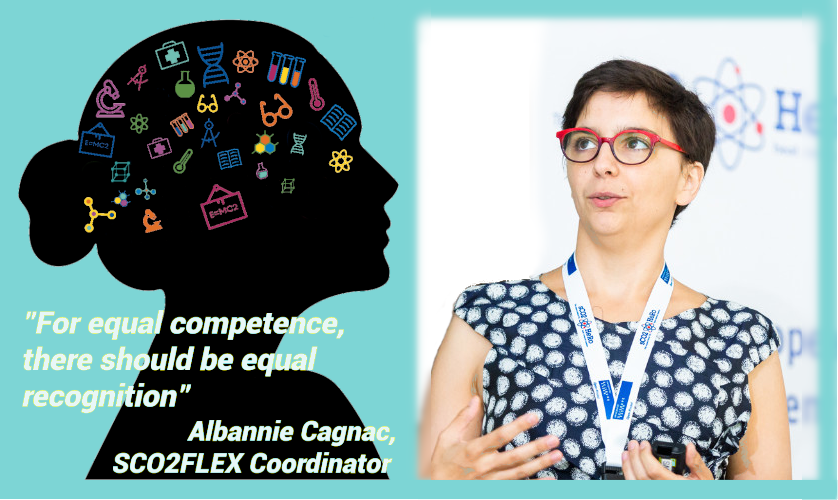To celebrate International Women’s day and highlight the success and importance of women in science, we decided to interview our project coordinator Albannie Cagnac.
Profile: Albannie Cagnac is a project manager for EDF R&D and a European H2020 project coordinator for the Sco2flex project. She has a Master’s degree in Applied Mathematics Research from the University of Toulouse III Paul Sabatier and a Master’s degree in Statistics and Econometrics from Toulouse School of Economics. She has been working in the energy sector since 2005, and enjoys building complex projects; putting her skills at the service of the investigation of multifaceted and innovative cases to determine the strategies that will enable the problems of these cases to be successfully addressed.
Specialties: Statistics, Data Mining, Spatial Data, Concept & Mind Maps , Project Management, Project Instruction
Fouille de données, Modélisation, Géostatistiques, Cartes conceptuelles et heuristiques
How did you first become interested in the energy sector?
Unlike most of my high school and university classmates, I have known for a long time that I wanted to work in an industry-oriented field. At the end of my studies, I had different choices: aeronautics, cars and energy. I chose the energy branch because I felt the need to work on subjects with a strong societal impact and very innovative. Energy met my expectations in terms of its usefulness to society and the challenges that lay ahead (reducing emissions, diversity of production methods, etc.).
Who are your main figures of reference in the field of research?
Apart from Ambroise Paré and Blaise Pascal, whose biographies and various works I have read, I don’t really have any reference figures in the field of science. On the other hand, in the field of the humanities, I appreciate the approaches in semiology of Roland Barthes and Umberto Eco as well as the works of the Hellenist Jacqueline de Romilly.
Are there still gender balance differences in your research environment?
I work in the nuclear research, so yes, there are always significant gender differences. It’s still a very masculine environment, but on a personal level, I don’t mind. As a matter of principle I do not like the idea of dividing or pitting men and women against each other. What matters to me is what the person I work with (manager, colleague, student, …) is able to bring and that he or she is able to fully express his or her opinion.
How do you think gender balance can be achieved in energy research?
The current inequality can only be resolved by increasing women’s access to the energy professions. Faced with a greater number of women in their ranks, companies and universities will be obliged to listen to them more carefully and thus gradually open up to greater involvement by women.
We should dare no longer confine women’s roles in senior positions to human resources departments or communication as is the case in some companies.
A woman is just as capable as a man of demonstrating rigour, creativity and managerial ability…
This progress can only be achieved by challenging traditional stereotypes:
- Girls are as good at science as boys
- Jobs in science also allow for a balance between private and professional life (on this point, I find that the new generation, all sexes combined, is more attentive than the previous ones)
- For equal competence, there should be equal recognition (and not, as at present, a submission to higher standards for women than for men in order to obtain promotion)
What are the current opportunities and challenges for women in science?
I will say that the opportunities and challenges for women are the same as those for men in scientific research subjects.
But beyond that, I think we should dare to give women more scientific projects and more responsibilities.
What is your long-term research goal?
In the long term, I would like to be able to continue working on disruptive technologies for energy production.
Many ideas and technologies are emerging, driven by start-ups or large companies. These ideas deserve our attention and, for the most promising ones, coordinated action by all the players in the energy world to help their development.
How would you encourage girls to study science and/or think about a professional career as researcher?
This can only be the result of a change in our society:
- The day when for the same grade in Mathematics/Physics/Biology, girls will have the same appreciation as boys (i.e. “Excellent Work” to the link of “very good”), our society will have progressed.
- The day when as many women as men are involved as scientific experts in the media, our society will have progressed.
For this, I see no other solution than to speak, communicate, testify, and be an example again and again. I think we have to show our girls that they can dare to trust each other and that they can claim to do science.
So I can never thank my daughter’s teacher enough for asking the girls in her class to give lectures on colour decomposition, Archimedes’ principle, fluid density, and for the boys to give lectures on ancient languages, mythology, to encourage them to change their point of view.
In your opinion, which is the added value of women working in research in the field of energy?
I think that from our experience as students or in companies where we always have to do more than men, women have a greater capacity to tackle a scientific problem as a whole.
We are used to juggling several tasks in our daily lives and this allows us to better visualize a problem in its integrality (the questions to be solved, the consequences of the work, the organization to be set up).
“If you educate a boy, you’ll have an educated man. If you educate a girl, you will have an educated woman, an educated family and an educated society” said Rita Levi Montalcini. This is even truer in sciences.
